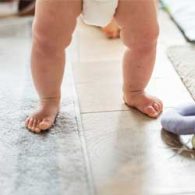Do Baby Walkers Affect Baby’s Development?
Do walkers affect a baby’s development in any lasting way?
First, to answer your question, there are no studies showing long-term developmental delays from the use of walkers – that sort of study would be very hard to do and has not been done. The studies do show, however, a short-term delay in walking, of up to several weeks.
In a nutshell, my strong feeling is to “waive the walker.” We decided not to use infant walkers for any of our eight children (after trying one briefly with the first two) for two reasons:
- The safety concerns of baby walkers
- The development issues that might result from assisted walking
A Doctor’s Safety Concerns of Baby Walkers
My husband, Dr. Bill, and our sons, Dr. Jim, Dr. Bob, and Dr. Peter have made plenty of trips to the emergency room to care for their nine- to-twelve-month-old patients who have been injured while scooting around in their walker. Several years ago, walker incidents prompted the American Academy of Pediatrics to suggest a law banning the sale and use of infant walkers because of injuries, such as skull fractures, neck injuries, lacerations, knocked out teeth, and burns. Some babies pushing walkers even get enough speed to crash through safety gates and fall downstairs. Fortunately, due to the safety warnings and improved, safer designs, walker accidents are now less than they used to be.
The Interference with Natural Progression of Baby Starting to Walk
Besides the safety concerns, walkers go against the normal process of infant motor development by giving the lower half of the body an ability that the upper half is not yet ready to cope with. Babies normally develop from head-to-toe, with their upper body strength progressing ahead of their lower body.
During the first year, a baby gradually gets more and more of her body off the ground, starting with raising her head, then chest, then tummy, then hips, then onto hands and knees, then standing with support, then taking a few steps while holding onto a caregiver, and then finally walking solo. Yet, in relying on the walker to do the work, baby has less of an interest in experimenting with her own body to learn crawling, cruising, and walking skills in a gradually progressing order. Watch a baby’s “walk” in a walker: it’s stiff-legged – different from the delightful way a beginning toddler naturally moves as he is encouraged and supported by the two hands of his caregiver.
Last Thoughts
The advice we’ve always given parents in our pediatric practice and followed in our own home in choosing any infant-care product is it should be safe, do good things for baby, and make life a bit easier for parents. Admittedly, if used sparingly and under supervision, walkers can be fun for baby and helpful for mommy while she is busy nearby. While I don’t believe the “benefits” at all merit buying one, if you choose to, be sure that you and your child’s caregiver never leave baby unattended in the walker, and never use it where there are unguarded steps or stairs.
Martha Sears, RN
Martha is the mother of Dr. Bill’s eight children, a registered nurse, a former childbirth educator, a La Leche League leader, and a lactation consultant. Martha is the co-author of 25 parenting books and is a popular lecturer and media guest drawing on her 18 years of breastfeeding experience with her eight children (including Stephen with Down Syndrome and Lauren, her adopted daughter). Martha speaks frequently at national parenting conferences and is noted for her advice on how to handle the most common problems facing today’s mothers with their changing lifestyles. Martha is able to connect with both full-time, stay-at-home mothers and working mothers because she herself has experienced both styles of parenting. Martha takes great pride in referring to herself as a “professional mother” and one of her favorite quips when someone voices their concern about her having eight children in an already populated world is: “The world needs my children.”

